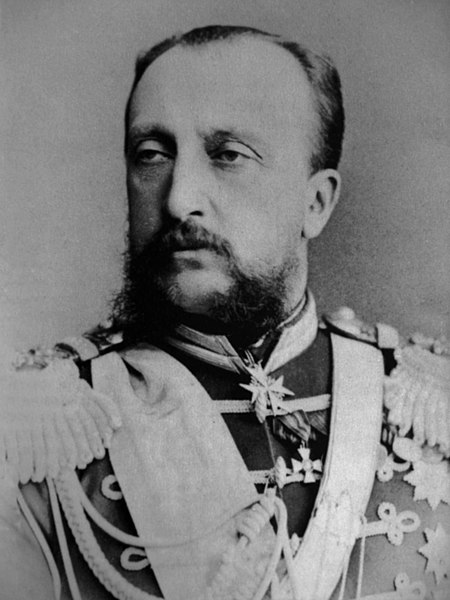on the Danube River front against the Russians in 1877
when he was ordered to cross over to the Russian side to
deliver a message to Grand Duke Nicholas.
Herewith a translation from Ottoman Turkish of his
account of that mission, which he wrote as an addendum
in 1909 to his book about the war "Autres Occasions
perdues" ('Missed Opportunities', written in French and
published in Paris in 1908).
Interestingly, İzzet Fuat's commander on the Danube
Front was Mehmed Ali Paşa, who was born a German
with the name Ludwig Karl Friedrich Detroit and who
was the great grandfather of the famous Turkish poet-
writer Nâzım Hikmet and the grandfather of statesman
Ali Fuat Cebesoy.//
Mehmet Ali Paşa click here for background.

İzzet Fuat was serving at Rusçuk, upper center of map, when
he crossed over to the Russian lines to deliver a message to
Grand Duke Nicholas.
Addendum to "Autres Occasions perdues" (Missed Opportunities)
An Envoy During War
At the beginning of July, during the late war, the decision was made to
send an envoy to the Russian Army. My commander, the late Field
Marshal Mehmed Ali Paşa, ordered me to assume this duty and to be
ready to depart the following day. The purpose of my mission was to
inform the Russian High Command that the Ottoman Government
wanted the hostilities to be conducted in as humane a manner as
possible; that the Ottoman Army had been ordered to abide by the
Geneva Convention; and that we had an organization comparable to
the western armies' Red Cross, namely the 'Hilal-i Ahmer' (Red
Crescent).
The next day, at around noon, as ordered, I presented myself at the
front of my commander's tent. But I was informed by his aides that
the commader was quite tired and wanted to rest a bit. In any case,
my instructions had not yet been written by the army secretary. As
will be seen, though, this delay had negative consequences.

Grand Duke Nicholas
Two hours later, the commander emerged from his tent and spoke very
politely to me, saying "my son, here is the letter for the Grand Duke
regarding the order about the Red Crescent. Also, here is a letter for
the Russian commander of the forward outpost, asking that you be
allowed to proceed to their main command, without being held up at
the front line. On this point you must be insistent. In the event that
they do not permit you to go ahead right away you must do everything
in your power to return here, because early tomorrow morning I will
launch a full-throttle attack on all sides, as I have informed Istanbul
with a telegram today. I'm sending my aide Hacı Efendi along with
you as far as the forward (Russian) outpost."
My commander asked me which horse I would ride and I told him I
would ride my horse 'Demir'. Then, together with a soldier carrying
a bugle and a white flag, we were ready to go. My commander,
though, reiterated that "don't forget, do not agree to spend the night
at the Russian foward outpost because early tomorrow I will attack
on all sides."
As we four Ottoman soldiers headed toward the Russian Army, our
own army's soldiers were positioned on the 'Aşıklar Tepesi' and 'Sarı
Nasuhlar' hills watching us the whole way, from our army's location
up until the line of forward Russian outposts. Our fellow soldiers were
concerned about us because a week earlier this duty had been given to
General Staff Major Seyfullah Bey, who had tried to cross to the
Russian line a bit to the north of here. Either because the land there
was obscured or because of some other mistake, the Russians opened
fire on Seyfullah Bey and his team, wounding two of their horses
and forcing them to return.
own army's soldiers were positioned on the 'Aşıklar Tepesi' and 'Sarı
Nasuhlar' hills watching us the whole way, from our army's location
up until the line of forward Russian outposts. Our fellow soldiers were
concerned about us because a week earlier this duty had been given to
General Staff Major Seyfullah Bey, who had tried to cross to the
Russian line a bit to the north of here. Either because the land there
was obscured or because of some other mistake, the Russians opened
fire on Seyfullah Bey and his team, wounding two of their horses
and forcing them to return.
In truth, I was not all that pleased about having to transit the 'no man's
land' between us and the Russian side. I could see this feeling in the
eyes of my compatriot Hacı, as well. At the time I was just 22-years-
old, an age where one sees danger where there isn't any and none
where there is. Hacı was a brave fellow, who, two months to the day
later would be martyred by an enemy bullet on a horrific day of
fighting. Like me, he was tense because the 'unknown' is the thing
that scares a man the most.
//END of PART I//
land' between us and the Russian side. I could see this feeling in the
eyes of my compatriot Hacı, as well. At the time I was just 22-years-
old, an age where one sees danger where there isn't any and none
where there is. Hacı was a brave fellow, who, two months to the day
later would be martyred by an enemy bullet on a horrific day of
fighting. Like me, he was tense because the 'unknown' is the thing
that scares a man the most.
//END of PART I//

Hiç yorum yok:
Yorum Gönder